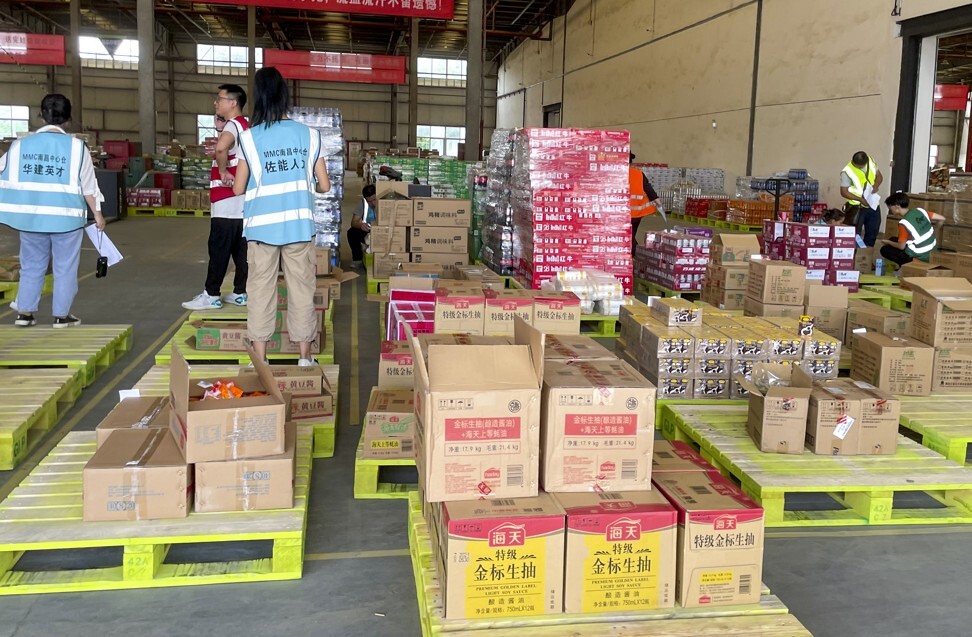
Alibaba consolidates community group buying operations under new Taocaicai brand
- Taocaicai is expected to offer more than 1 million products from around the world to community group buying users in China
- The new brand will work closely with Alibaba’s logistics unit Cainiao and food delivery service Ele.me

Chinese e-commerce giant Alibaba Group Holding is doubling down and escalating its community group buying operations through a new brand called Taocaicai, as competition in this growing retail market segment intensifies amid Beijing’s tightened regulation.
Consumers can access Taocaicai, where they can find more than 1 million products from around the world, on the homepage of shopping platform Taobao Marketplace and the Taobao Deals’ app.
“Taocaicai is for a better life, providing people with more affordable and good products, as well as more convenient and warm service,” said Trudy Dai Shan, head of Taocaicai and one of Alibaba’s select partners. “It should also help farmers increase their income and enable small shops to get better.”
It will work closely with Alibaba’s smart logistics operation Cainiao Network and food delivery service Ele.me, according to a company statement.
A latecomer in China’s community group buying market, Alibaba’s foray in March this year was pursued under a team called MMC. This led to the integration of Alibaba’s business-to-business platform Lingshoutong, which connected small family-run retailers and gave their businesses a tech upgrade, with the firm’s community group buying enterprise Hema Jishi. Taocaicai was established from the merger of Hema Jishi and Taobao Grocery.

Alibaba’s latest move shows that community group buying remains a hot business model in mainland China amid the coronavirus pandemic. This market is forecast to be worth about 104 billion yuan (US$16 billion) this year, up 38 per cent from 2020, according to consultancy China E-commerce Research Centre.
Hailed by tech companies as a way to cut out the middleman by connecting food suppliers directly with consumers, community group buying operations have all the hallmarks of “blitzscaling” – an aggressive growth model that sacrifices profits in the short term to acquire more users.
China’s state media, however, has denounced the group buying industry’s cash burn strategy as a number of start-ups have either filed for bankruptcy or reduced operations amid the financial hardship caused by their “subsidy wars” to seize market share.
That commentary from the Economic Daily, a newspaper directly under the Central Committee of the Chinese Communist Party, followed news that community group buying provider Nice Tuan, which is backed by Alibaba, ceased operations in multiple cities in August. Alibaba owns the South China Morning Post.
On-demand local services provider Meituan, agriculture-focused e-commerce firm Pinduoduo and ride-hailing giant Didi Chuxing are among the Big Tech companies that compete with various start-ups in the community group buying market segment.
Still, even the most deep-pocketed players face a reality check amid fierce competition. Chengxin Youxuan, the group buying business of Didi, recently closed operations in a number of cities, resulting in lay-offs.
Meanwhile, Beijing’s increased scrutiny of Big Tech has widened to include community group buying platforms.
In March, Didi, Meituan, Pinduoduo and Nice Tuan were each fined 1.5 million yuan by China’s State Administration for Market Regulation (SAMR) for price dumping and fraud. In May, the SAMR slapped Nice Tuan with another 1.5 million yuan fine for failing to take action on those illegal practices.
“With more pressure from the policy side, [the community group buying sector’s] ‘price war’ that relies solely on subsidies will be significantly reduced,” according to a recent report by Kaiyuan Securities. The report said the companies are expected to “shift their focus to improving efficiency”, while broadening their market penetration.